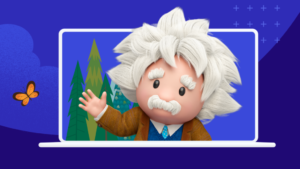So there we have it – the future of AI has arrived at Salesforce. Following the swift rollout of Sales GPT and Service GPT, Salesforce announced Marketing and Commerce GPT at Connections in June.
This continues the rollout of new features leveraging Einstein AI, baking generative AI fully across the Customer 360. Whilst AI capabilities have been available for many years, we are now moving from Predictive AI to Generative AI. This is described by Salesforce as a world-first in CRM. For an overview of Salesforce’s GPT announcements, take a look at Zoe’s blog.
But what does that really mean for marketers?
First and foremost, let’s explore the recent announcement. Salesforce released the first phase of Marketing GPT – Segment Creation – as part of the Summer ‘23 release. But before you get excited and start trying to fire up GPT to build your segments – it is currently only available as a limited pilot. Every GPT feature will be subject to rigorous piloting before becoming more widely available. Therefore, you should definitely place release schedules, available features, and any pricing you may see in the category of a forward-looking statement. This means no purchasing or investment decisions should be made based on these as yet!
This is all part of Salesforce’s dedication to Trust. Ensuring that GPT elements are always under human control and working on the data and parameters you provide is paramount. Since Einstein runs off your own data and no-one else’s, Salesforce is undertaking detailed checks on every feature. This means ensuring that each feature reacts as expected, returns relevant information and there are no gaps in the structures. The Marketing Keynote at Connections covers this in more detail.

What sort of functionality are we looking at?
The features themselves do however look truly groundbreaking.
Take Segment Creation (currently scheduled for general release later in 2023). It allows marketers to build a segment using natural language to query your database. Einstein GPT then translates this and returns the perfect prospects and audience size. In the example at Connections, they imagined asking Marketing GPT to “build an audience based on people ages 25 – 30, based in Chicago, going to Connections”. Once the segment is created, you can continue adjusting the audience using natural language to get the optimum results. Einstein GPT will find the right people for you without needing to build complex queries, or trying to remember whether to use “is not greater than” or “is less than” in segmentation.
Winter ‘24 should see the next piloted feature which will allow for email content creation. In much the same way, you will be able to use conversational language to build your campaign brief. Furthermore, you can use Einstein GPT to enrich your copy. This enables deep personalization based on the data you have about an individual. So it’s easy to embed “welcome back” messages or “nice to meet you” messages for returning or first-time customers.
With a future enhancement (date unannounced) led by a partnership with Typeform, Einstein GPT will be able to enhance any images you choose to add to an email. For instance, taking a plain picture and adding a background based on your requests, brand guidelines and other parameters. There’s a great demonstration of this on Salesforce+
Clearly, then, the future of generative AI is in its ability to create, personalise and tailor your marketing campaigns to give a truly impactful moment to each of your customers.

So are the machines taking over, are marketers basically out of a job?
Actually, it doesn’t look that way. Salesforce bills Einstein GPT as a way for marketers to “fuel creativity”, “unlock efficiency” and “scale personalisation”. Humans will still need to proof, make decisions and tweaks, and ultimately sign off and send campaigns. But this allows you to have more time to explore new ideas, rapidly test new strategies, and make improvements on the fly. With GPT functionality spreading across Sales, Service, Slack, Tableau and more, it will become easier to report, collaborate, refine and improve your messaging. And before all that, of course, it’s going to be crucial to get your data in good order. Without this, you won’t be able to get the best insights, the greatest personalisation or the most accurate audience.
Looking for help with Account Engagement?
Sounds great, how do marketers get their hands on the goods?
The crucial technology here is Data Cloud. Data Cloud allows you to unify your data sources and produce a single source of truth for your customer data. This allows you to tap into the full profile of a customer, regardless of where they interact with you. With Data Cloud, you can harmonise your data and then take action across the Customer 360 – based on what customers are doing at any given moment.
Data Cloud does of course come with a cost. However, as of Summer ‘23 release, Data Cloud now has integrations with both Marketing Cloud Account Engagement and Marketing Cloud Engagement. But since the future of marketing looks to be centred around GPT, it is yet to be seen how all these products will knit together. And of course, there are no set timelines on when any of this will be available for us all to get our hands on. So maybe the future isn’t quite here yet.
